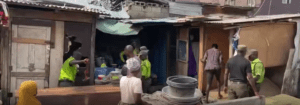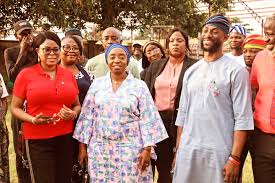
Domestic violence: LASG extends fellowship with NGOs to empower victimised women
By Moses Adeniyi
The Lagos State Government (LASG) in its effort to address rising occurrences of gender and domestic violence has extended its fellowship scope with Non Governmental Organisations (NGOs) and Civil Society Organisations (CSOs) to protect women victims of domestic and gender based violence.
With the engagement, the Government aims to strengthen advocacy and campaigns against domestic violence, while creating empowerment modalities to help victimised women.
This, the State Government mentioned, was essential to protect vulnerable women from being victimised and create a secure way out for those who fear what would become of them when they need to take an exit from a home where they are being abused.
The State Commissioner for Women Affairs and Poverty Alleviation (WAPA), Mrs. Cecilia Dada, at the strategic Year 2023 Interactive Meeting with Women – focused Non-Governmental Organizations (NGOs) organised by the Ministry of WAPA., said the State Government have taken the engagement on empowerment so very keen to ensure social inclusion for women to be empowered, essentially to derisk them from vulnerability.
She said the symbiotic liaison is targeted at empowering women and prevention of violence against them, raising “awareness and advocacy to create a society where women are empowered and protected from violence.”
Dada disclosed that the Ministry under her watch has upscaled its conditional cash transfer scheme to vulnerable women to N50,000 from N20,000, noting that it was targeted at empowering them to engage productively in business.
She said the engagement affords the opportunity to rub minds with stakeholders on progress testament to “collective commitments in creating a society where women have equal opportunity to thrive and succeed.”
She added that the engagement would further ensure formulation of strategies to address challenges facing women in the Society, while giving them equal access to empowerment, education, and skills to enable them not only to “improve their own lives, but also contribute significantly to the overall development of our communities and nation.”
Lamenting that women face barriers in participation and representation across sectors, she said the need to address the challenges informed the engagement to devise practical solutions to reducing poverty to the the barest minimum through empowerment of women and defence of women’s rights.
“Working with stakeholders will certainly help to maximise impact towards the most vulnerable portion of the population,” she said, mentioning that proactive approaches, such as leveraging ICT with relevant data would be adopted by her Ministry to work abreast of development as they unfold.
She added that the Ministry would foster strategies to enable women generate sustainable income.
The Commissioner said the Ministry seeks to leverage enhancing economic empowerment; education and skills development; health and reproductive rights; gender-based violence prevention and response; social protection programmes; advocacy and policy reform; collaborations and partnerships; collaborations and partnerships; data collection and analysis to empower and protect women.
On gender based violence, she said the Ministry is working towards implementing strategies to deliberately tackle domestic and gender based violence with response tables established in the 57 LGAS and LCDAs across the State.
She called on the stakeholders to be versatile in their reach in the campaign to reduce poverty to the barest minimum.
On her part, the Director Domestic Violence Unit, Ministry of WAPA, Mrs Olorunfemi Toyin, lamented that women due to current economic situations in the Country are increasingly exposed to indulging in dehumanising ventures such as trafficking, illicit sex labour, and drug abuse, among others.
This, she said, has further exposed them and made them vulnerable to incurable diseases as HIV, and other incommunicable diseases.
This, she said, informed why the State Government has further engagement with the stakeholders to extend the tentacles of the outreach to protect vulnerable women.
“We should not relent as NGOs and CSOs to change the narrative. We can work together, go everyhwere even in the rural and riverine areas to change the situation,” she said.
She stressed that empowering domestic violence survivors financially remains critical to helping the victims.
“Tell the women you are not supposed to die in that marriage, come to WAPA there is help for you,” she said.
She, however, said premarital counselling is key for women before going into marriage, as a preventive measure to addressing domestic violence.
She said advocacy was ongoing strongly with interministerial network including the State Ministries of Health, WAPA, Youth and Social Development, to tackle gender and domestic violence in the State.
On his part, John Afemikhe of Joe Oriaze Imhanwa Foundation, called for creation of a system of re-orientation of domestic violence survivors, fostered by the State Government in collaboration with relevant stakeholders.
He said the re-orientation was vital, having noted that when women come out of abusive marriages, their mental states are affected, mentioning that without such reorientation for rehabilitation, they are likely to transfer the aggression on to the society.
The stakeholders called for vibrant legislation to address the lag in domestic violence fighting, calling for stricter campaigns, psycho-social interventions, robust databases and stronger awareness to further strengthen the engagement.



